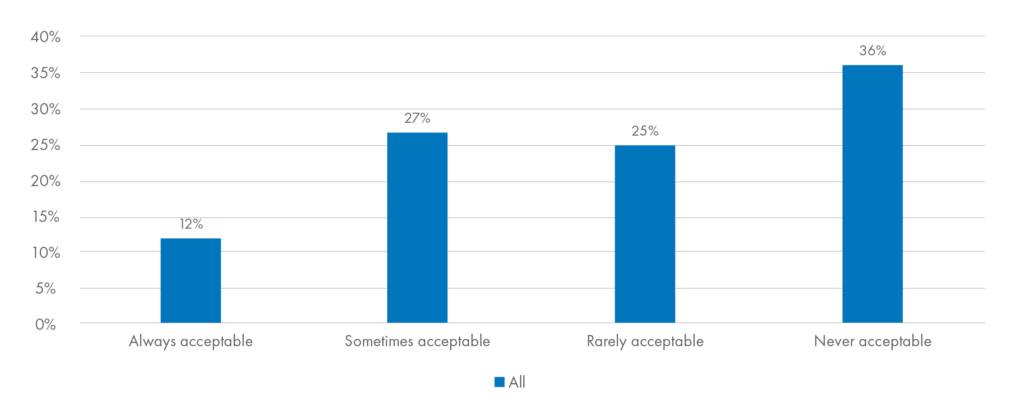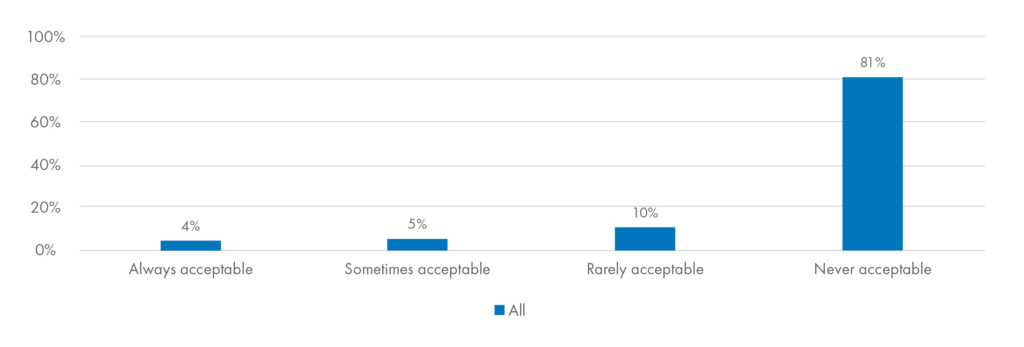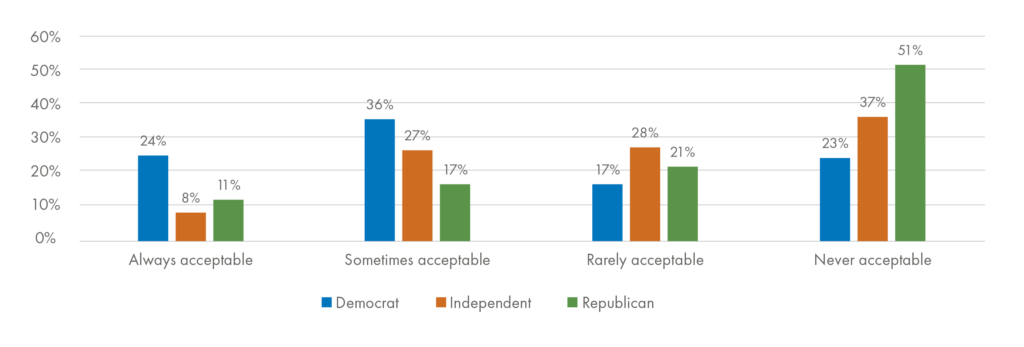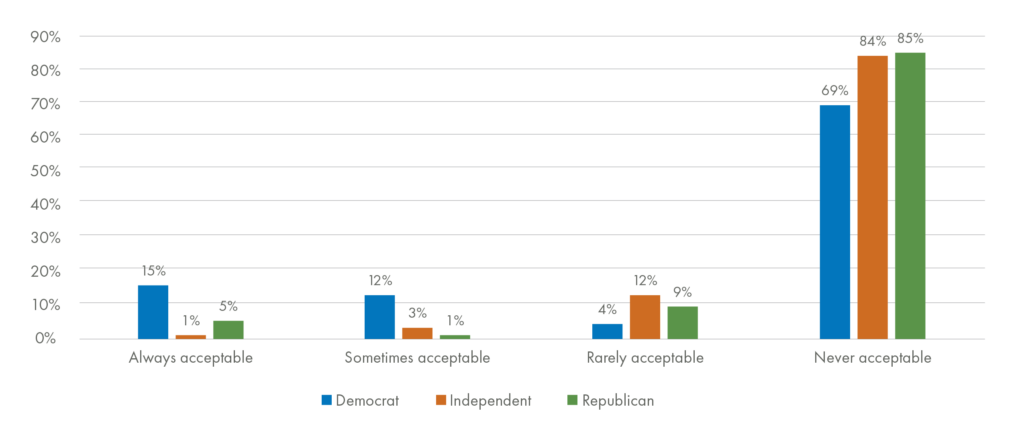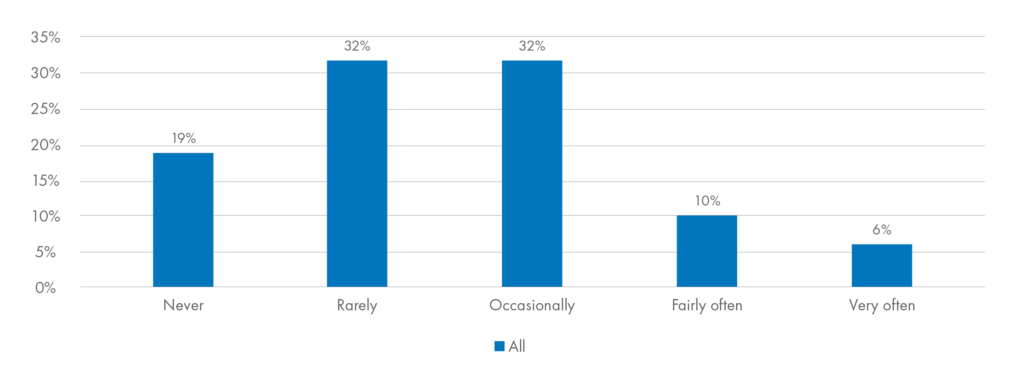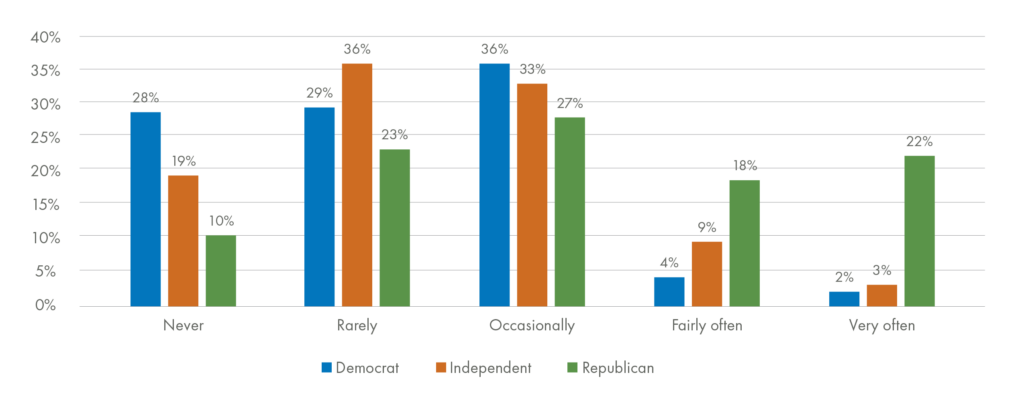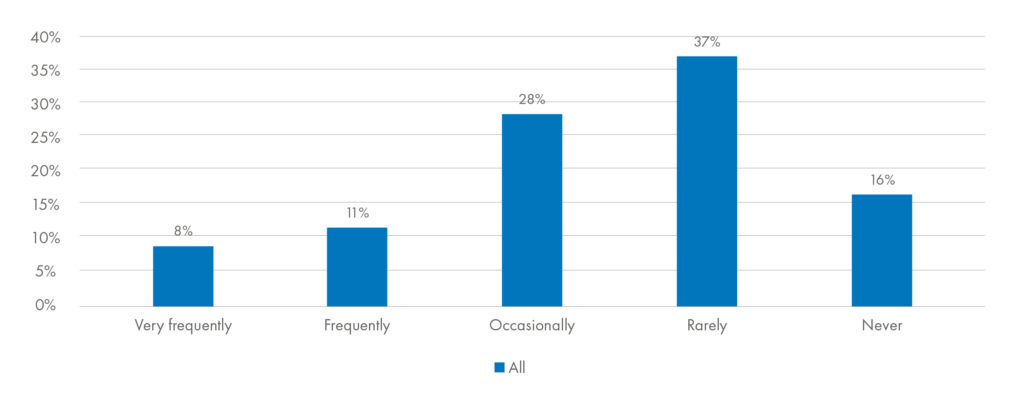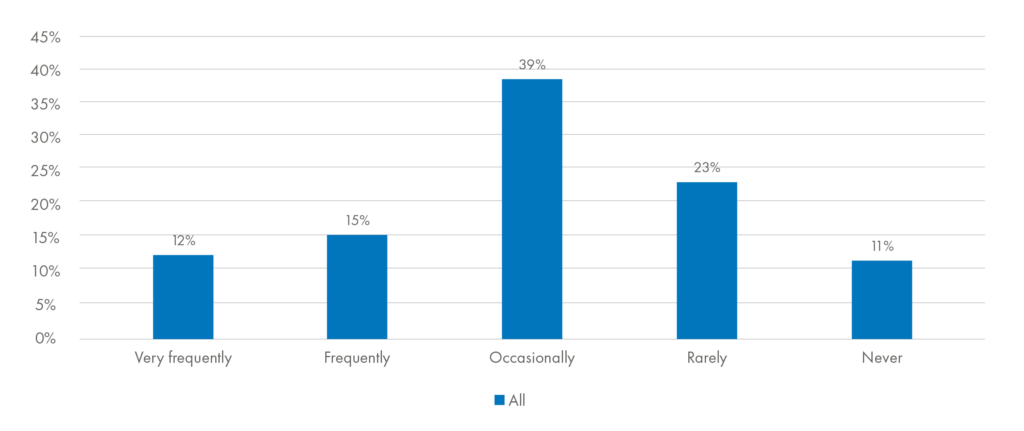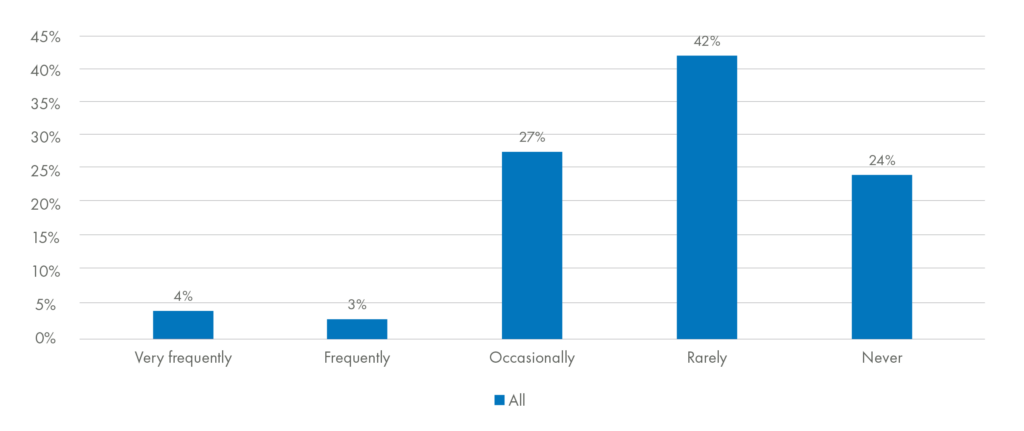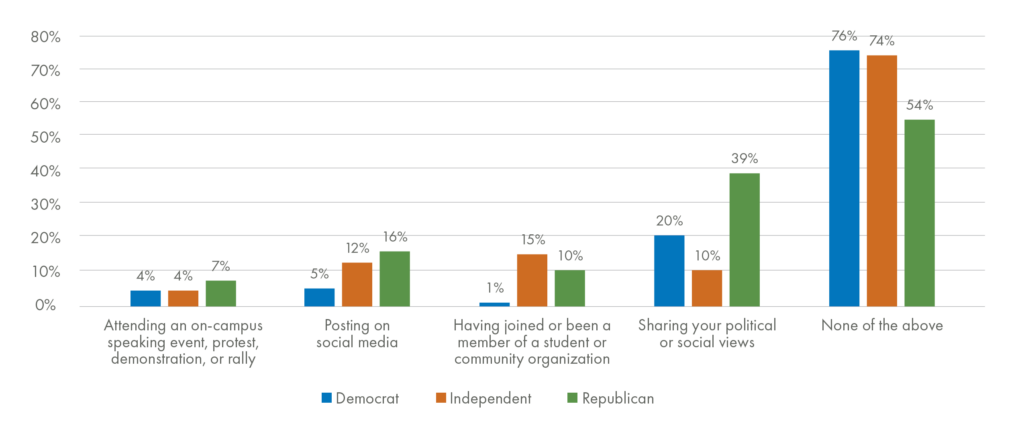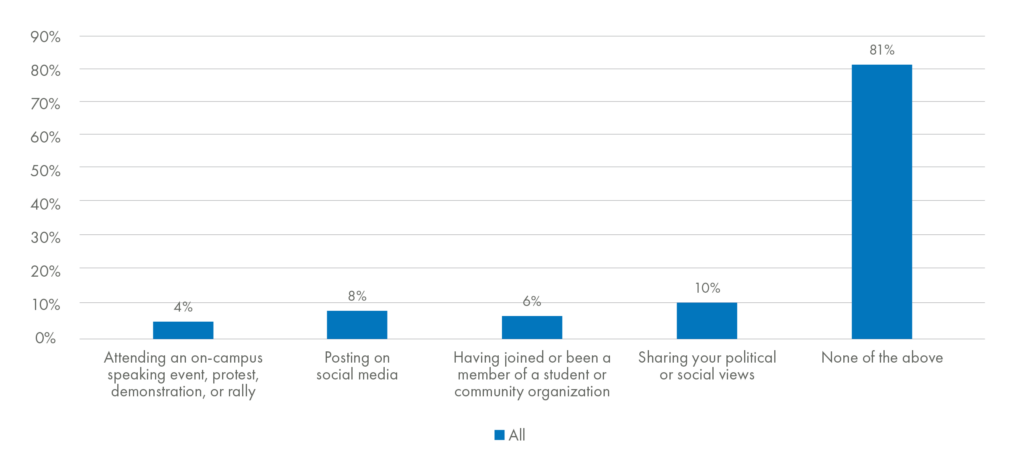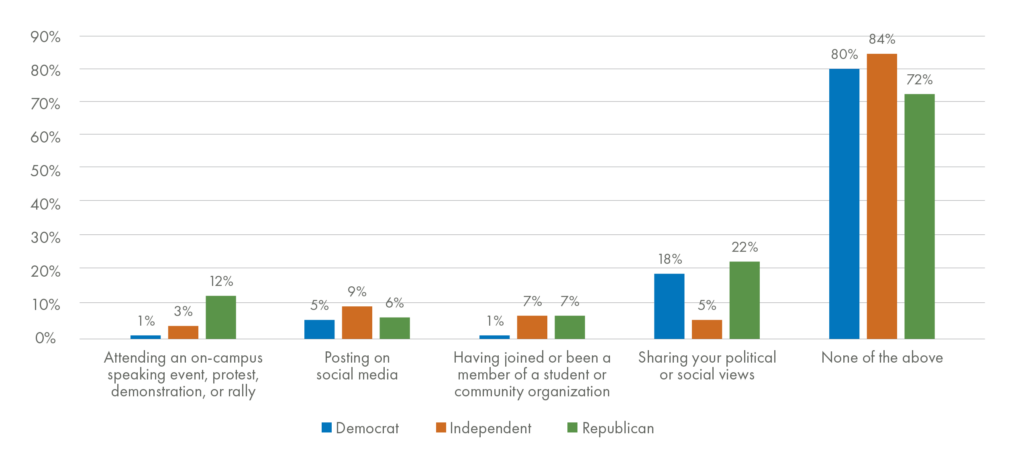Introduction
Self-censorship and intolerance among college students are pervasive problems on American campuses. The following report, based on a survey of 284 undergraduate students conducted by the American Council of Trustees and Alumni (ACTA) and College Pulse, shows that Furman University is not exempt from these trends. Furman students reported high levels of self-censorship, considerable intolerance for opposing viewpoints, and experiences of social exclusion and harassment due to expressing their views. The survey also demonstrates significant differences between self-identifying liberal and conservative students. Those in the liberal majority are more likely to express intolerance and less likely to report self-censorship compared to their conservative peers.
Key Findings Include:
- Thirty-nine percent of respondents said shouting down a speaker is always or sometimes
acceptable.
- Nine percent of those surveyed said using violence to prevent someone from speaking is always
or sometimes acceptable. This number rose to 27% among Democratic students, compared to
6% among Republicans.
- Forty-eight percent said they self-censor at least occasionally. Forty percent of Republicans said
they do so fairly or very often, compared to only 6% of Democrats.
- Almost half of students reported experiencing or witnessing uncivil treatment for sharing political
or social views at least occasionally. Respondents reported witnessing frequent or very frequent
uncivil treatment of students with conservative views four times as often as those with liberal or
progressive views.
- Thirty-nine percent of Republicans and 20% of Democrats reported being socially excluded for
sharing their political or social views.
- Twelve percent of Republicans reported experiencing threats of harassment for attending an on-campus
event compared to 1% of Democrats. Twenty-two percent of Republicans and 18% of
Democrats reported experiencing threats of harassment for sharing their political or social views.
Intolerance
Numerous guest speakers are shouted down on college campuses each year. Even more disturbingly, some are confronted violently, as Charles Murray and his interlocutor, Allison Stanger, were at Middlebury College in 2017, or, more recently, like former NCAA swimmer Riley Gaines, who was accosted by protesters and trapped in a room for several hours at San Francisco State University. These disruptions demonstrate an extreme level of intolerance for differing viewpoints that has no place on a college campus.
Unfortunately, the respondents to our survey at Furman demonstrated a significant willingness to shout down guest speakers: Thirty-nine percent said shout-downs are always or sometimes acceptable, and only 36% said they are never acceptable. In addition, almost one-fifth of respondents said engaging in violence to prevent a speaking event is at least rarely acceptable.
Q8: How acceptable would you say it is for students to engage in the following action to protest a campus speaker: **Shouting down a speaker to prevent them from speaking on campus**?
Q10: How acceptable would you say it is for students to engage in the following action to protest a campus speaker: **Using violence to stop a campus speech**?
Our survey also revealed significant differences on these questions between Democrats and Republicans in the Furman student body. Sixty percent of Democrats said shout-downs are at least sometimes acceptable, whereas only 35% of Independents and 28% of Republicans said the same. Fifty-one percent of Republicans said shout-downs are never acceptable, compared to only 23% of Democrats. Similarly, and somewhat astonishingly, we found that 27% of Democrats said violence is always or sometimes acceptable, compared to only 4% of Independents and 6% of Republicans. These results indicate that Democratic students—the majority political group on campus—have a much higher level of intolerance for opposing viewpoints than those with minority political views.
Q8: How acceptable would you say it is for students to engage in the following action to protest a campus speaker: **Shouting down a speaker to prevent them from speaking on campus**?
Q10: How acceptable would you say it is for students to engage in the following action to protest a campus speaker: **Using violence to stop a campus speech**?
Self-Censorship
Given the levels of intolerance discussed above, it is not surprising that self-censorship is also common among students at Furman, especially among Republicans. Forty-eight percent of respondents said they self-censor at least occasionally, and one in six said they do so frequently. However, Republican respondents are more likely to self-censor: Forty percent do so fairly or very often, compared to 6% of Democrats. This suggests that Republican students feel their views are not welcome on campus. It also means students of all political persuasions are being deprived of opportunities to hear a full range of views.
Q1: On your campus, how often have you felt that you could not express your opinion on a subject because of how students, a professor, or the administration would respond?
Q1: On your campus, how often have you felt that you could not express your opinion on a subject because of how students, a professor, or the administration would respond?
Uncivil Treatment, Social Exclusion, and Harassment
Resorting to violence or shout-downs are clear violations of the right to free expression that should be protected on every college campus. Academic communities should foster a spirit of civility and reasoned discourse in which community members listen to and respect one another, even when they disagree. Yet, our survey found that students at Furman often experience uncivil treatment and social exclusion for expressing their political opinions.
Q2: How often have you personally experienced or witnessed others experience uncivil treatment from other students for stating a political opinion?
Forty-seven percent of students reported experiencing or witnessing such uncivil treatment at least occasionally. The disparity between Right and Left is once again evident: Sixty-six percent of students reported experiencing or witnessing uncivil treatment of students for expressing conservative views at least occasionally, compared to only 34% in the case of students who expressed liberal or progressive views.
Q3: How often have you witnessed a student with conservative beliefs receive uncivil treatment for expressing those beliefs on campus?
Q4: How often have you witnessed a student with liberal or progressive beliefs receive uncivil treatment for expressing those beliefs on campus?
Social exclusion is often one of the main reasons that students with minority viewpoints are unlikely to share them. Consistent with the responses to previous questions, our survey showed that Republicans were more likely than Independents and Democrats to report such exclusion, once again highlighting the need to create a campus culture in which a wide range of views are welcomed and accepted. Most notably, 39% of Republicans, compared to only 20% of Democrats reported being socially excluded for sharing their political or social views.
Q14: Have you been socially excluded due to any of the following actions?
Finally, we asked students if they have experienced threats or harassment in response to various activities, such as attending an on-campus event or sharing their political and social views. One in five students reported that they have faced such treatment. Further, 12% of Republicans said they have experienced threats of harassment for attending an on-campus event, compared to 1% of Democrats. Twenty-two percent of Republicans and 18% of Democrats reported the same for sharing their political or social views. These findings suggest that Furman must work to improve its students’ tolerance for different points of view.
Q16: Have you experienced threats of harassment from fellow students due to any of the following actions?
Q16: Have you experienced threats of harassment from fellow students due to any of the following actions?
Conclusion
Our survey reveals that, like at many colleges and universities in the United States, intolerance and self-censorship are serious problems at Furman. The conditions are especially bad for those who hold to Republican or conservative points of view. At a liberal arts college like Furman, students should be encouraged to hear and debate a variety of political and intellectual positions. If some views are rarely heard on campus because those who would express them self-censor or are shouted down, then the whole university community is deprived of the opportunity to grapple with issues academically—by exploring and sifting through all possible arguments using reason and evidence. Students are also ill-prepared to be citizens in a democratic republic if they are not taught to engage those with different political views through persuasion and negotiation, rather than exclusion and harassment. Furman University’s proud tradition of educating future leaders and responsible citizens is in jeopardy, and it must take action to create a campus culture in which free expression and diversity of thought are not only protected, but welcomed and celebrated.
Survey Methodology
This survey was designed and conducted by College Pulse. Interviews were conducted in English among a sample of 284 undergraduate students who are currently enrolled at Furman University.
The initial sample was drawn from College Pulse’s Undergraduate Student Panel that includes over 400,000 verified students representing more than 1,000 different colleges and universities in all 50 states. Panel members are recruited by a number of methods to help ensure diversity in the panel population, including web advertising, permission-based email campaigns, and partnerships with university organizations.
To reduce the effects of any non-response bias, a post-stratification adjustment was applied based on demographic distributions from the 2017 Current Population Survey (CPS). The post-stratification weight rebalanced the sample based on the following benchmarks: age, race and ethnicity, and gender. The sample weighting was accomplished using an iterative proportional fitting (IFP) process that simultaneously balances the distributions of all variables. Weights were trimmed to prevent individual interviews from having too much influence on the final results.

